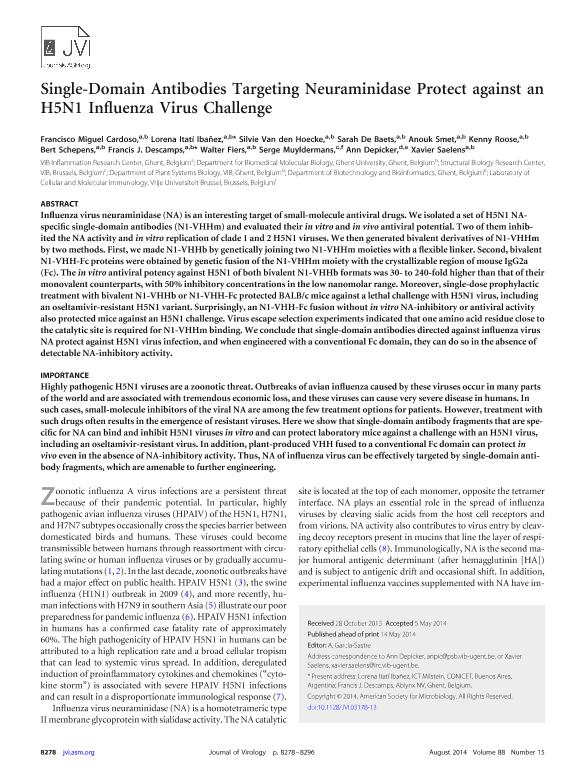Mostrar el registro sencillo del ítem
dc.contributor.author
Cardoso, Francisco Miguel
dc.contributor.author
Ibañez, Lorena Itatí

dc.contributor.author
Van Den Hoecke, Silvie
dc.contributor.author
De Baets, Sarah
dc.contributor.author
Smet, Anouk
dc.contributor.author
Roose, Kenny
dc.contributor.author
Schepens, Bert
dc.contributor.author
Descamps, Francis J.
dc.contributor.author
Fiers, Walter
dc.contributor.author
Muyldermans, Serge
dc.contributor.author
Depicker, Ann
dc.contributor.author
Saelens, Xavier
dc.date.available
2016-02-11T19:52:31Z
dc.date.issued
2014-05
dc.identifier.citation
Cardoso, Francisco Miguel; Ibañez, Lorena Itatí; Van Den Hoecke, Silvie; De Baets, Sarah; Smet, Anouk; et al.; Single domain antibodies targeting neuraminidase protect against an H5N1 influenza virus challenge; American Society for Microbiology; Journal of Virology; 88; 15; 5-2014; 8278-8296
dc.identifier.issn
0022-538X
dc.identifier.uri
http://hdl.handle.net/11336/4154
dc.description.abstract
Influenza virus neuraminidase (NA) is an interesting target of small-molecule antiviral drugs. We isolated a set of H5N1 NAspecific single-domain antibodies (N1-VHHm) and evaluated their in vitro and in vivo antiviral potential. Two of them inhibited the NA activity and in vitro replication of clade 1 and 2 H5N1 viruses. We then generated bivalent derivatives of N1-VHHm by two methods. First, we made N1-VHHb by genetically joining two N1-VHHm moieties with a flexible linker. Second, bivalent N1-VHH-Fc proteins were obtained by genetic fusion of the N1-VHHm moiety with the crystallizable region of mouse IgG2a (Fc). The in vitro antiviral potency against H5N1 of both bivalent N1-VHHb formats was 30- to 240-fold higher than that of their monovalent counterparts, with 50% inhibitory concentrations in the low nanomolar range. Moreover, single-dose prophylactic treatment with bivalent N1-VHHb or N1-VHH-Fc protected BALB/c mice against a lethal challenge with H5N1 virus, including an oseltamivir-resistant H5N1 variant. Surprisingly, an N1-VHH-Fc fusion without in vitro NA-inhibitory or antiviral activity also protected mice against an H5N1 challenge. Virus escape selection experiments indicated that one amino acid residue close to the catalytic site is required for N1-VHHm binding. We conclude that single-domain antibodies directed against influenza virus NA protect against H5N1 virus infection, and when engineered with a conventional Fc domain, they can do so in the absence of detectable NA-inhibitory activity.
dc.format
application/pdf
dc.language.iso
eng
dc.publisher
American Society for Microbiology

dc.rights
info:eu-repo/semantics/openAccess
dc.rights.uri
https://creativecommons.org/licenses/by-nc-sa/2.5/ar/
dc.subject
Influenza A
dc.subject
Nanobody Vhh
dc.subject
Neuraminidase
dc.subject
Antiviral
dc.subject.classification
Virología

dc.subject.classification
Ciencias Biológicas

dc.subject.classification
CIENCIAS NATURALES Y EXACTAS

dc.title
Single domain antibodies targeting neuraminidase protect against an H5N1 influenza virus challenge
dc.type
info:eu-repo/semantics/article
dc.type
info:ar-repo/semantics/artículo
dc.type
info:eu-repo/semantics/publishedVersion
dc.date.updated
2016-03-30 10:35:44.97925-03
dc.journal.volume
88
dc.journal.number
15
dc.journal.pagination
8278-8296
dc.journal.pais
Estados Unidos

dc.journal.ciudad
Washington
dc.description.fil
Fil: Cardoso, Francisco Miguel. VIB Inflammation Research Center; Bélgica. Ghent University. Department for Biomedical Molecular Biology; Bélgica
dc.description.fil
Fil: Ibañez, Lorena Itatí. Consejo Nacional de Investigaciones Científicas y Técnicas. Oficina de Coordinación Administrativa Parque Centenario. Instituto de Ciencias y Tecnología "Dr. Cesar Milstein"; Argentina. VIB Inflammation Research Center; Bélgica. Ghent University. Department for Biomedical Molecular Biology; Bélgica
dc.description.fil
Fil: Van Den Hoecke, Silvie. VIB Inflammation Research Center; Bélgica. Ghent University. Department for Biomedical Molecular Biology; Bélgica
dc.description.fil
Fil: De Baets, Sarah. VIB Inflammation Research Center; Bélgica. Ghent University. Department for Biomedical Molecular Biology; Bélgica
dc.description.fil
Fil: Smet, Anouk. VIB Inflammation Research Center; Bélgica. Ghent University. Department for Biomedical Molecular Biology; Bélgica
dc.description.fil
Fil: Roose, Kenny. VIB Inflammation Research Center; Bélgica. Ghent University. Department for Biomedical Molecular Biology; Bélgica
dc.description.fil
Fil: Schepens, Bert. VIB Inflammation Research Center; Bélgica. Ghent University. Department for Biomedical Molecular Biology; Bélgica
dc.description.fil
Fil: Descamps, Francis J.. VIB Inflammation Research Center; Bélgica. Ghent University. Department for Biomedical Molecular Biology; Bélgica
dc.description.fil
Fil: Fiers, Walter. VIB Inflammation Research Center; Bélgica. Ghent University. Department for Biomedical Molecular Biology; Bélgica
dc.description.fil
Fil: Muyldermans, Serge. Structural Biology Research Center; Bélgica. Vrije Universiteit Brussel. Laboratory of Cellular and Molecular Immunology; Bélgica
dc.description.fil
Fil: Depicker, Ann. VIB. Department of Plant Systems Biology; Bélgica. Department of Biotechnology and Bioinformatics; Bélgica
dc.description.fil
Fil: Saelens, Xavier. VIB Inflammation Research Center; Bélgica. Ghent University. Department for Biomedical Molecular Biology; Bélgica
dc.journal.title
Journal of Virology

dc.relation.alternativeid
info:eu-repo/semantics/altIdentifier/url/http://jvi.asm.org/content/88/15/8278.long
dc.relation.alternativeid
info:eu-repo/semantics/altIdentifier/doi/http://dx.doi.org/10.1128%2FJVI.03178-13
Archivos asociados
